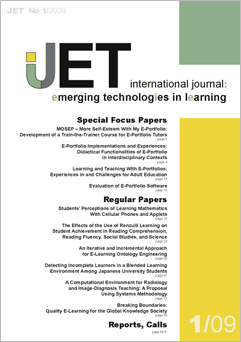The Effects of the Use of Renzulli Learning on Student Achievement in Reading Comprehension, Reading Fluency, Social Studies, and Science
DOI:
https://doi.org/10.3991/ijet.v4i1.629Keywords:
Internet technology, reading comprehension, reading fluency, learningAbstract
Renzulli Learning is an on-line educational profile and educational learning system designed to match student interests, learning styles, and expression styles with a vast array of educational activities and resources designed to enrich and engage studentsâ?? learning process. In this experimental study, quantitative procedures were used to investigate the use of Renzulli Learning on oral reading fluency, reading comprehension, science achievement, social studies achievement of 383 elementary and middle schools students. The research took place in two schools, an urban middle school in Georgia where half of all students are considered to be at risk due to poverty or other factors, and a suburban elementary school in southern California. Students in grades 3 5 (n = 185) and grades 6 8 (n = 198) were randomly assigned to use Renzulli Learning for 2-3 hours each week for a 16-week period. Students in the treatment groups were compared to students who did not have the opportunity to use Renzulli Learning in control classes in the same schools. A two-way repeated-measures ANOVA was used to explore differences between treatment and control students. After 16 weeks, students who participated in Renzulli Learning demonstrated significantly higher growth in reading comprehension (p < .001), significantly higher growth in oral reading fluency (p = .016), and significantly higher growth in social studies achievement (p = .013) than those students who did not participate in Renzulli Learning.
Downloads
Published
2008-11-15
How to Cite
Field, G. B. (2008). The Effects of the Use of Renzulli Learning on Student Achievement in Reading Comprehension, Reading Fluency, Social Studies, and Science. International Journal of Emerging Technologies in Learning (iJET), 4(1), pp. 29–39. https://doi.org/10.3991/ijet.v4i1.629
Issue
Section
Papers



